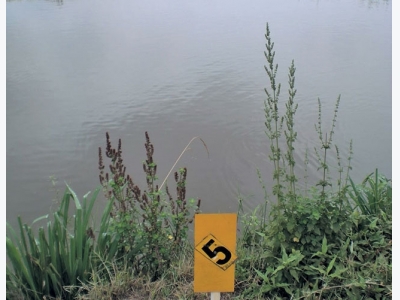Small scale fish farming

With government assistance, many rural small-scale fish farmers could turn their operations into viable enterprises.
A small-scale farmer’s neatly numbered ponds. Photo: By Nicholas James
Mashudu Tamba (not his real name) is an elderly fish farmer from Thohoyandou who has a small pond farm in Venda, Limpopo. He owns a piece of land on which he grows vegetables and raises chickens, as well as a house and a fish farm. His son helps him on the farm.
Tamba is one of many smallholders who were encouraged by government to try their hand at aquaculture. He dug the nine ponds, the largest of which is about 250m2 and one metre deep, with the help of family and neighbours on vacant swampy land near a seasonal watercourse. He fills the ponds from a small spring on his land.
He fills the ponds from a small spring on his land.
Tamba stocked his ponds with tilapia obtained from nearby streams, and also received a number of fish from local government agencies. He has since given fish to some of his neighbours who also have ponds.
Initially, he fed the fish with feed pellets donated by the Department of Agriculture Forestry and Fisheries (DAFF); nowadays, however, he tends to use kitchen waste, left-over maize meal and whatever else is available as feed.
His ponds are full of fish of varying sizes: a few larger ones of 15cm to 20cm and numerous fry and fingerlings, as tilapia breed precociously. Nonetheless, production is very limited, and he catches no more than 10 to 20 fish a month from each pond. He either sells them or uses them himself.
Tamba’s operation is effectively a ‘wild fishery’, and he could do with some help. According to the National Environmental Management: Biodiversity Act of 2004, he is contravening the law, as he is farming fish collected locally, which are alien Nile tilapia, or Nile/Mozambique hybrids, from the upper Levuvhu river catchment.
However, he is unaware of this, as the fish are abundant locally, and used by everyone in Venda aquaculture. They are a source of protein for many people in the area, and the water bodies are now becoming over-fished.
It is not Tamba’s fault that Nile tilapia have invaded the Levuvhu River system; that is an historical fact going back to the 1990s. Nor does he have an obligation to use Mozambique tilapia when Nile tilapia are already present; he has a family to feed. However, he could more than treble his yield if he were allowed to farm fish in an up-to-date manner.
Rather than utilising poor quality stock, he should be provided with a permit to use the best improved strains of Nile tilapia. He may not have the infrastructure to produce all-male fingerlings, but these improved Nile tilapia strains only mature at large sizes anyway, and will be harvested by then. His production would then increase from a few dozen to several hundred kilograms per year.
DAFF could source quality fingerlings from private hatcheries and donate them as an extension service. Once Tamba’s neighbours see his production soar, they will also want to get involved and aquaculture will become successful.
Denying him the right to proper aquaculture only serves to perpetuate poverty.
Related news
Tools

Phối trộn thức ăn chăn nuôi

Pha dung dịch thủy canh

Định mức cho tôm ăn

Phối trộn phân bón NPK

Xác định tỷ lệ tôm sống

Chuyển đổi đơn vị phân bón

Xác định công suất sục khí

Chuyển đổi đơn vị tôm

Tính diện tích nhà kính

Tính thể tích ao



 Cold-tolerant tilapia can weather winter’s chill
Cold-tolerant tilapia can weather winter’s chill  Why aquaculture is stressful for fish
Why aquaculture is stressful for fish